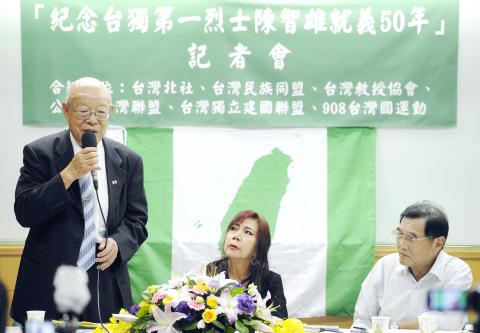Pro-independence groups yesterday paid tribute to Taiwanese independence activist Chen Chih-hsiung (陳智雄) at a press conference that commemorated Chen’s execution 50 years ago by the Chinese Nationalist Party (KMT) regime.
Chen’s daughter, Vonny Chen (陳雅芳), displayed her father’s final letters written before his execution — which she did not receive until March this year — at the news conference organized by the World United Formosans for Independence (WUFI).
Born in Pingtung in 1916, Chen was executed on May 28, 1963. According to WUFI, Chen was the first Taiwanese independence activist to be executed in Taiwan.

Photo: George Tsorng, Taipei Times
Vonny Chen, who grew up in Indonesia and does not speak Mandarin, told the press conference in English that her resentment toward her father as a child vanished after getting to know more about her father’s “courageous story” as she became older.
“I received compensation from Taiwan’s government about 10 years ago, but I could not care less about the money because I would rather have my father back,” Vonny Chen said, adding that she never knew about the letters and properties of her father in government archives until March.
Chen Chih-hsiung, described as “the No. 1 martyr for Taiwanese independence” by his acquaintances, was always high-spirited in his prison cell, said Liu Chin-shih (劉金獅), who stayed next door to him in prison.
Chen Chih-hsiung shouted “Long live Taiwan independence” twice before he was sent to the execution ground on that fateful day, Liu said.
Knowing that Chen had always been proud of his belief and refused to be intimidated by prison officials or the fear of death, the soldiers smashed his feet, pierced his cheek with steel wires and stuffed a cloth in his mouth before dragging him to the execution ground, Liu said.
A multilinguist, Chen worked as a translator in Indonesia for the Japanese Imperial Army during the Pacific War and after World War II, became a jewelry dealer there, where he assisted in the Indonesian independence movement and was imprisoned by the Dutch.
Chen later devoted his energy to the Taiwanese independence movement and was named ambassador to Southeast Asia by the Japan-based provisional government of the Republic of Taiwan in February 1958 and served in that capacity until he left for Japan later that year.
Chen was kidnapped by the KMT officials in Japan and returned to Taiwan the following year, but he kept working for the independence movement. He was arrested by the Taiwan Garrison Command in 1962 and charged with rebellion.

A preclearance service to facilitate entry for people traveling to select airports in Japan would be available from Thursday next week to Feb. 25 at Taiwan Taoyuan International Airport, Taoyuan International Airport Corp (TIAC) said on Tuesday. The service was first made available to Taiwanese travelers throughout the winter vacation of 2024 and during the Lunar New Year holiday. In addition to flights to the Japanese cities of Hakodate, Asahikawa, Akita, Sendai, Niigata, Okayama, Takamatsu, Kumamoto and Kagoshima, the service would be available to travelers to Kobe and Oita. The service can be accessed by passengers of 15 flight routes operated by

Alain Robert, known as the "French Spider-Man," praised Alex Honnold as exceptionally well-prepared after the US climber completed a free solo ascent of Taipei 101 yesterday. Robert said Honnold's ascent of the 508m-tall skyscraper in just more than one-and-a-half hours without using safety ropes or equipment was a remarkable achievement. "This is my life," he said in an interview conducted in French, adding that he liked the feeling of being "on the edge of danger." The 63-year-old Frenchman climbed Taipei 101 using ropes in December 2004, taking about four hours to reach the top. On a one-to-10 scale of difficulty, Robert said Taipei 101

MORE FALL: An investigation into one of Xi’s key cronies, part of a broader ‘anti-corruption’ drive, indicates that he might have a deep distrust in the military, an expert said China’s latest military purge underscores systemic risks in its shift from collective leadership to sole rule under Chinese President Xi Jinping (習近平), and could disrupt its chain of command and military capabilities, a national security official said yesterday. If decisionmaking within the Chinese Communist Party has become “irrational” under one-man rule, the Taiwan Strait and the regional situation must be approached with extreme caution, given unforeseen risks, they added. The anonymous official made the remarks as China’s Central Military Commission Vice Chairman Zhang Youxia (張又俠) and Joint Staff Department Chief of Staff Liu Zhenli (劉振立) were reportedly being investigated for suspected “serious

Taiwanese and US defense groups are collaborating to introduce deployable, semi-autonomous manufacturing systems for drones and components in a boost to the nation’s supply chain resilience. Taiwan’s G-Tech Optroelectronics Corp subsidiary GTOC and the US’ Aerkomm Inc on Friday announced an agreement with fellow US-based Firestorm Lab to adopt the latter’s xCell, a technology featuring 3D printers fitted in 6.1m container units. The systems enable aerial platforms and parts to be produced in high volumes from dispersed nodes capable of rapid redeployment, to minimize the risk of enemy strikes and to meet field requirements, they said. Firestorm chief technology officer Ian Muceus said